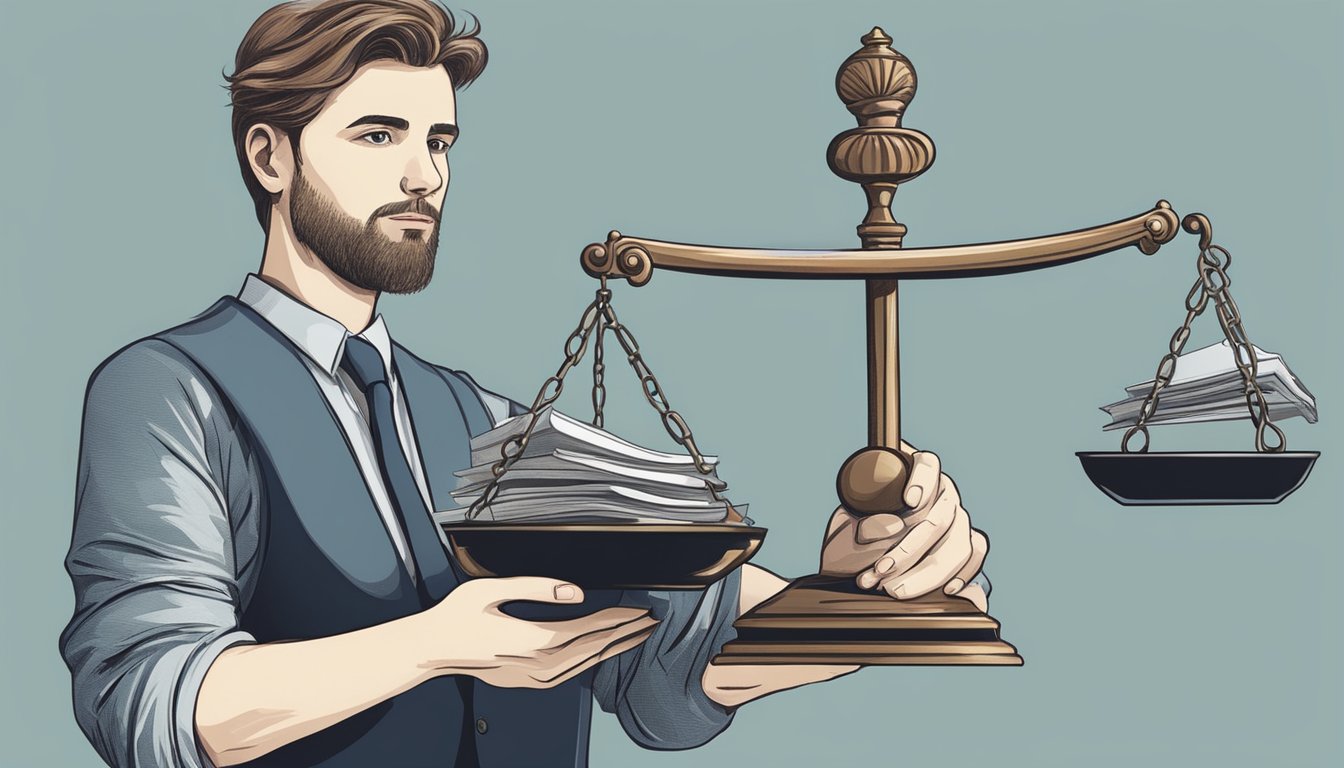Understanding Legal Responsibility

Legal responsibility in the insurance industry involves various concepts and duties that you must navigate.
It’s essential to know your actions and their implications under different laws and regulations.
Liability: This refers to the legal obligation to compensate for harm or loss caused by your actions.
In the insurance context, liability ensures that parties are held accountable through appropriate coverage.
Negligence: When an individual or corporation fails to exercise the duty of care, resulting in harm, they may be deemed negligent.
Insurance policies often cover negligence to protect against unexpected claims.
Key Actions and Obligations
Knowing your responsibilities and duties is crucial in the insurance sector:
- Duty of Care: This legal duty requires you to act with reasonable care to prevent harm to others.
- Contractual Obligations: These are duties outlined in an insurance contract, ensuring both parties adhere to agreed terms.
- Statutes: Specific laws may dictate aspects of insurance, such as those under the ACA, aimed at protecting consumers.
Types of Liability
Various types of liability you might encounter:
- Professional Liability: Coverage like E&O insurance protects you from legal costs arising from claims of errors or omissions (E&O insurance).
- Auto Liability: Protects against claims from auto accidents, ensuring financial security (auto insurance).
Tort Law
Insurance often intersects with tort law, which deals with civil wrongs not arising from contracts.
Understanding how torts like negligence impact your liability is vital.
Tort law ensures that individuals or entities are held liable for harm caused, reinforcing the importance of proper coverage.
Key Considerations
- Ensure you have adequate insurance coverage to mitigate financial risks.
- Understand and fulfill your legal duties and obligations, whether through professional practice or corporate actions.
Navigating legal responsibility in the insurance industry requires a clear understanding of your obligations, potential liabilities, and the protective measures available through various policies.
Liability in Practice

Understanding liability in practice can help you navigate the risks and responsibilities within the insurance industry.
Below, specific case studies will illustrate concrete examples.
Case Studies
-
Medical Malpractice Insurance
Medical professionals often face lawsuits. Suppose a patient suffers an injury because of a doctor’s mistake. If the harm results in medical bills or lost wages, medical malpractice insurance can protect the doctor from a severe financial loss. This insurance not only covers legal fees but also any damages awarded to the plaintiff, helping maintain professional stability. -
Product Liability
Imagine a business sells a product that causes accidents due to a design flaw. This can lead to legal liability. Customers harmed by the product might file lawsuits for their injuries. To manage these risks, companies often invest in product liability insurance. This insurance covers the cost of legal defense and any fines or settlements that might be imposed due to breaches in product safety. -
Professional Liability for Businesses
For businesses, professional liability insurance is pivotal. It protects against claims that result from mistakes or negligence in professional services. For instance, if a financial advisor gives poor advice leading to a client’s debt, the insurance would cover legal costs and potential financial outcomes. Such coverage ensures businesses remain operational even when facing significant legal challenges.
Having proper liability insurance is essential to safeguard your business and manage unforeseen legal challenges effectively.
These case studies demonstrate the crucial role of insurance in maintaining trust and financial security within professional settings.
Related Terms
Insurance Cancellation
When considering legal responsibility, it’s essential to understand the process of insurance cancellation.
This involves ending an insurance policy before its expiration date, which can impact liability and protection.
In the insurance and financial sectors, fiduciary duty requires individuals to act in the best interest of another party.
This obligation ensures integrity and prioritizes clients’ interests, affecting legal and financial responsibilities.
Claimant
The role of a claimant is crucial in legal matters.
A claimant is someone who files a claim for damages or benefits.
Understanding this role helps you navigate the complexities of filing insurance claims and knowing your rights.
Bodily Injury
Bodily injury is a significant term in both legal and insurance contexts.
It refers to physical harm sustained by an individual, which can lead to claims for compensation and affect liability considerations.
Civil Law
In civil law, liability determines how individuals or organizations are held accountable for their actions.
Unlike criminal law, which can lead to imprisonment, civil law often involves compensating the affected party.
Strict Liability
Strict liability holds parties accountable for damages regardless of fault.
In the insurance industry, this can apply to cases like product liability, where a manufacturer can be liable for damages caused by a defective product.
Damages
Damages refer to the compensation owed to a claimant.
This can include medical bills, lost wages, and other expenses resulting from an incident.
Courts and juries determine the amount of damages based on evidence presented.
Premises Liability
Premises liability involves the responsibility of property owners to ensure their premises are safe.
If an individual is injured on their property, the owner may be liable for damages.
This is a common issue in both personal and commercial insurance claims.
Consent
Consent is a critical factor in legal responsibility.
Without proper consent, actions that cause harm can result in liability.
For example, a patient’s consent is required before medical treatment can be administered.
Understanding these terms helps navigate the insurance industry and ensure your rights and obligations are clear.






